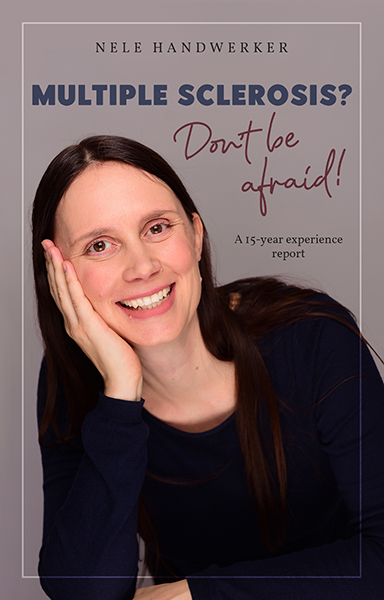This time it’s about an invisible MS symptom, cognitive impairment. At least 40 percent of people with MS suffer from it, but the number could be significantly higher, as there are still no standardized tests that are regularly performed on everyone. In recent years, however, more and more attention has been paid to the invisible symptoms, as they are also interesting as early indicators of physical impairments occurring later. Moreover, nowadays, treatment providers try to stop multiple sclerosis as completely as possible, and for this it is important to detect all deteriorations in order to be able to take countermeasures if necessary.
Klicken Sie auf den unteren Button, um den Podcast zu laden.
Table of contents
How do cognitive disorders manifest?
You notice it when you can no longer follow a long conversation or an explanation properly. And this doesn’t mean complicated lectures or long speeches.
When you have to read a text over and over again. Again, this is not about Hermann Hesse’s endless sentences, which are probably difficult to grasp for most people. No, it is about an above-average poor comprehension and a strongly reduced memory. Your counterpart has to explain something to you for the third time. You listen as best you can. You want to understand, but either you don’t succeed in the first place or the information is not stored permanently. This is frustrating.
Cognitive disorders can also mean that you try to plan something and act on it, but often fail. This can be in the private sphere, when it comes to cooking a meal or to work procedures.
Maybe you also experience problems with word finding. Everyone has that from time to time. But if it becomes a frequent problem, or you don’t really know the meaning of words, then MS may be to blame.
Often thinking also becomes more rigid. Taking a different perspective or being open to arguments or new insights that all of a sudden completely change the state of affairs.
All these problems are also known to people without multiple sclerosis. But then there is usually a reason, such as severe fatigue, increased alcohol consumption, other intoxicants, disinterest in the subject, headaches, other pains or distracting factors.
Meanwhile, in people with multiple sclerosis, cognitive impairment may be part of the clinical picture. Either lesions in the central nervous system are directly responsible or severe fatigue. And if the MS can progress unhindered without you taking countermeasures, it leads to a faster reduction of the brain volume. This of course then has an impact.
Many people with MS are more likely to take early retirement or have to reduce their hours because of cognitive impairment. But the good news is, there are several things you can do about it.
Summary of the types of cognitive disorders
Cognitive disorders can affect your performance in several areas. These include:
- memory with both short and long term memory
- attention and concentration – listening, reading, speaking
- mental flexibility
- information acquisition and processing
- the ability to keep in mind / process several things at the same time (multiple tasking)
- the ability to plan and execute
Or you have word-finding difficulties and even forget the meaning of words you once knew and thus lose the context and understanding of a subject, an explained topic.
How are cognitive disorders treated?
Talk to your neurologist if you feel that multiple sclerosis is affecting your cognitive abilities. A comprehensive neuropsychological examination will help him make an accurate diagnosis, which should be the first step in any treatment. This will also define your exact problem, i.e. which mental abilities are affected.
If, for example, fatigue is mainly responsible for your problems, a different treatment must be initiated than if depression is the cause. But these are only two possible triggers or amplifiers. By the way, it is worthwhile to have your sleep analyzed in case of chronic fatigue. Often the quality of sleep is poor and there are many ways to optimize and normalize it again.
In general, you should participate in life as actively as possible to exercise your mind. But plan regular breaks where you can relax.
With the right balance of challenge and relaxation and targeted training, seemingly lost abilities can be reactivated and improved. For example, you can become more attentive and train your perception.
If the training does not achieve the desired effect, it is necessary to compensate for the lost abilities. Here you learn new behaviors to better manage your time, including necessary breaks, to organize yourself or to train your memory.
In your working life it may be required that you inform your colleagues and superiors about what is no longer possible. Of course, it is always good to point out your current possibilities and make it clear that it is not a case of bad intentions but of force majeure. Perhaps you can continue to perform your tasks with a different approach, be it sequence, more breaks or use of aids. Feel free to ask your doctor, physiotherapist or occupational therapist for advice.
What alternative methods, aids and medications are available?
Relaxation techniques can be a cornerstone that helps you regain your quality of life. The more you put yourself under stress because something doesn’t work the way it used to, the more you feed the problem. Try to deal with it as calmly as possible, and don’t be angry with yourself, your body or your mind.
Meditation, yoga, autogenic training or Tai Chi are some possibilities, but there are many more.
Time management is a skill that can help you cope better with everyday life. It teaches you to eliminate distracting factors and to bundle tasks so that you can work through them more efficiently and not constantly jump back and forth in your mind. Better planning takes stress out of everyday life, be it personal or professional. The meal plan for the week with a matching grocery list. The packing list for the vacation. If you do exhausting tasks at the beginning of an active session, you can work on routine tasks afterwards when you are a bit tired. There are really lots of behaviors that will allow you to function and enjoy life despite cognitive limitations.
Unfortunately, no medications are currently available that have been proven to have positive effects in scientific studies. However, if your limitations come from poor sleep, there are several options available. Talk to your neurologist about this.
What can you do in acute phases?
Stay calm, even though you may find it difficult at times. Avoid making important decisions or dealing with complex tasks where mistakes on your part could have long-term negative consequences for you.
By this I mean, for example, rearranging your finances including decisions to liquidate something, make a new deal, etc.
If your concentration is severely impaired, please do not participate in traffic as a driver and also be careful as a pedestrian.
If meditation is for you, practice it regularly. It can certainly make a positive contribution to your mental and spiritual well-being.
Talk to your neurologist or MS nurse. They can best assess whether further measures are useful.
And what if cognitive disorders permanently burden everyday life?
Then it is even more important that you learn to deal with the new actual state. Learn techniques to compensate for lost abilities. Use tools like digital reminders. And continue to train your mind regularly to maintain this level.
You can do this on the side, by learning or continuing a creative hobby, from learning to sew, to paint and draw, to craft, to carpentry, to photography, and more. The important thing is that you enjoy it and keep exploring new territory, be it through a new pattern, a new painting technique, a certain style. As long as you introduce a little variance and don’t keep sewing the same blue T-shirt in size S with the same thread on the same sewing machine, your brain will be stimulated.
Learning a language, listening to music, dancing, cooking, playing a new sport, programming, creative writing or gardening are also stimulating activities.
Of course, you can also consciously train your cognitive skills. There are now various apps available.
Lifelong learning is good for everyone, but especially for people with MS.
What is the best prevention against cognitive disorders?
Avoid neurotoxic substances. At the top of the list is smoking. Multiple sclerosis is really a good reason to stop. Seek help, it’s available from any health insurance company in the form of numerous books and other media formats, or at https://smokefree.gov/ or your local initiative. I guess more or less all countries have offers and your general practicioner will be able to help you.
You might want to listen to episode 22, the interview with Dr. Claudia Marck:
Alcohol also damages the brain, with steady use and even more so in higher amounts or in high percentage form. I have been drinking almost no alcohol since my diagnosis in the summer of 2004, and my brain volume is age-appropriate. It is one piece I can contribute to a positive prognosis. After an initial phase of adjustment, you can live with it well and if someone in your circle of acquaintances can’t handle it, it’s not your problem, but that of the other person.
Other intoxicants should also be avoided, of course.
And if you follow a strict diet, such as vegan, then please make sure that you get all the nutrients you need in sufficient quantities and take supplements if necessary.
Finally, as always, a functioning disease-modifying therapy together with a healthy lifestyle and a balanced state of mind is the best prevention.
Food for thought
Regular training of your mind, if possible daily or at least several times a week helps you best. Your brain behaves like a muscle – more training strengthens it and without training it becomes weaker and weaker. And as with physical training, it is important to take breaks and of course drink enough, preferably water, tea or diluted juices.
You can eat nuts and legumes more often and why not train your brain by trying out different recipes that feed your brain with nutrients and stimulate the gray cells to think. It doesn’t get much better than that, does it? Delicious and healthy.
Question for you
Are you or have you already been affected by cognitive disorders? And if so, how do you deal with it?
See you soon and try to make the best out of your life,
Nele
For more information and positive thoughts, subscribe to my newsletter for free.
Click here for an overview of all podcast episodes published so far.

And at many more places.
* This text contains affiliate links. This means that I get a small compensation if you buy the product recommended by me through the link. For you nothing changes in the price of the product. And it helps me to pay for the blog and to write new posts.










